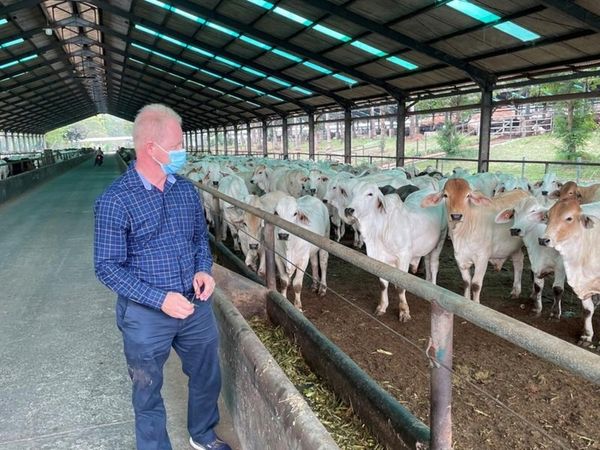Australia's Agriculture Minister says the country's national farm lobby is ignorant in its criticism of the coalition's pre-election budget and suggests it is a "sideline critic that doesn't understand the science".
At the centre of the spat between David Littleproud and the National Farmers' Federation is a nasty viral infection that threatens to shut down the red meat and dairy sectors if it were detected in Australian cattle and buffalo.
Lumpy skin disease is spread by flies, ticks and mosquitoes and was detected in Indonesia earlier this month.
This year's Federal budget committed $61.9 million to "boost Northern Australian frontline biosecurity" over four years, "including to safeguard our northern border against lumpy skin disease and other emerging vector-borne animal diseases".
There was also $20 million over three years for livestock traceability.
Despite welcoming some regional funding commitments, the National Farmers' Federation said the "steady" budget had failed to deliver adequate and sustainable funding for Australia's biosecurity system.
"An investment of $15 million in the financial year 2023 to ward off a lumpy skin disease incursion falls short given the serious risk to international markets".
Agriculture Minister David Littleproud responded, saying, "that's ignorance from the NFF".
"We've sent our chief veterinary officer to Indonesia, and they want to Singapore to make sure that we can work constructively with them."
"It's (lumpy skin disease) not going to come in through our ports. "It's actually going to blow in.
"And so, putting $60 million-plus into more boots on the ground in terms of surveillance is at this stage is all we can do.
"Otherwise, you just be spending money on lumpy skin that we don't have."
He said the government saw it as a real threat, and was taking steps.
"The department is giving us the advice the scientists are giving us advice, not sideline critics that don't understand the science."
Australian Dairy Farmers, another lobby group, also called for more biosecurity funding.
"Dealing with the threat of lumpy skin disease far exceeds the $61.6 million over four years provided to address that and other biosecurity risks," ADF spokesperson Craig Hough said.
The biosecurity spend in this year's budget includes $10 million for the states to respond to the Japanese Encephalitis virus.
The agriculture sector has long been calling for a sustainable funding model to fund biosecurity.
In the 2018 budget, Mr Littleproud announced the government would raise $325 million over three years through a biosecurity levy via a $10.02 charge per 20-foot shipping container and a $1 per tonne levy on bulk imports.
But after more than a year of lobbying from cement, minerals and freight groups against the idea, the levy was axed.
On Wednesday morning, Mr Littleproud said the government was now in the final stages of consultation about a cost-recovery model relating to biosecurity funding.
He said this year's federal budget outlined $600 million in new funding commitments for the agriculture sector.
That includes $267.1 million to streamline the export process, $27.3 million to boost on-farm biodiversity and $100 million in tax breaks for carbon farmers.
The budget also included at least $20 billion in infrastructure and regional development spending.










